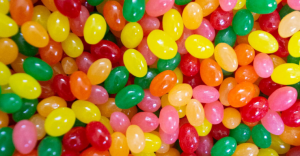
Candy. Gummy candy, soft candy, chewy candy, chocolate, mints. There are endless varieties of these sweet treats, and they are thoroughly enjoyed by both children and adults alike. These little luxuries are beloved in the United States, and we’ve got the numbers to prove it.
In 2015, approximately 18% of the world’s chocolate confectioneries, by value, had been consumed solely by Americans. No wonder, since for every day of the week, close to 25% of American adults choose to eat at least one candy piece.
You’d think that candy would be consumed much more often and in greater quantities by our children, but on the contrary, it is adults who enjoy 65% of the total produced candy annually. Interestingly, children eat 4 chewy or hard candies for every one (chewy or hard candy piece) consumed by the adults. So chocolate is the leading treat of choice in the U.S.
Every year, we consume a staggering 2.8 billion pounds of chocolate! Per person, this amounts to over 11 pounds each of the total 25 pounds of all candy types consumed by the average American, or almost half. That’s about 51 bars a year.
Let’s Talk About Chocolate
There are different types of chocolate: the three main types consist of milk, dark, and white chocolate. What exactly makes up each type varies, but all include the ingredient cocoa in some form.
Milk Chocolate
This beloved type of chocolate is the most popular type of candy bar. In terms of composition, milk chocolate is made up of over 12% milk solid (hence the name) and between 10% to 20% of cocoa solids (cocoa and cocoa butter).
Dark Chocolate
Dark chocolate is semi-sweet, darker in color, and firmer in texture. It typically consists of just two ingredients, sugar and chocolate liquor. In order to be defined as dark chocolate, at least according to the FDA, it should consist of at least 15% chocolate liquor, although generally, this percentage is closer to 50%, often even higher than that.
When we reach a cocoa solid content of 70% and over, that is when dark chocolate moves into bittersweet chocolate territory. This type of chocolate has been increasing in popularity over time, particularly due to the health benefits it provides.
White Chocolate
Lastly, we have white chocolate, which some argue is not actually chocolate since it does not contain any cocoa solids. In the end, however, this type does contain ingredients from the cacao bean, and what defines white chocolate (according to the FDA) is a content of a minimum 20% of cocoa butter and 14% milk, with no more than 55% sugar.
Gourmet Candy
Looking at the more exact definitions of chocolate and what its various types consist of, it is clear that a lot goes into the making of these sweet treats in general. A great deal of care can be put into making them as a craft. Let’s talk about gourmet candy.
What is gourmet candy? As opposed to, say, mass-produced bags of gummy candies or bulk chocolate, the process of creating gourmet candy involves greater care. For example, when it comes to gourmet chocolates, factors such as the quality and source of the cacao beans themselves, how they are processed, and the percentages of cacao and cacao butter within a bar all play roles in the quality of the resulting bar.
Whether you prefer a bulk bag of candy from the grocery store or gourmet candy from a specialty shop, it’s clear that candy has made its mark here in the U.S., for both children and adults alike.

Leave a Reply
You must be logged in to post a comment.